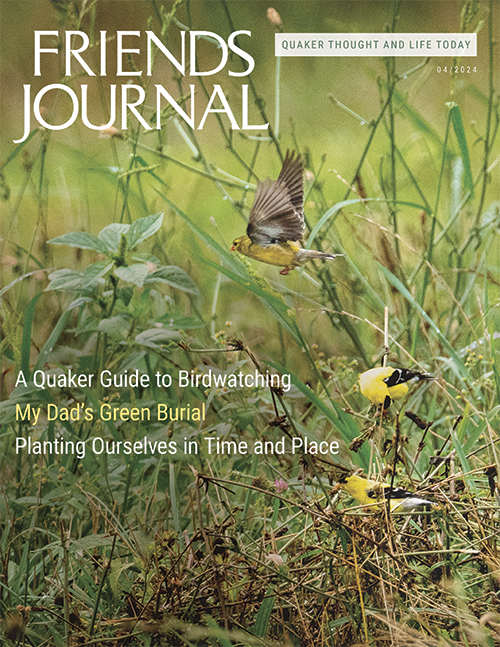Praying for results
Peter Blood-Patterson’s article on holding in the Light (“We Are All Held in Love,” FJ Mar.) really spoke to me. I have always felt that praying for a particular result was risky. As he stated, if the desired outcome does not come to pass, the pray-er may feel that they didn’t pray “hard enough,” or that the prayer’s beneficiary was somehow “out of harmony with God.” In addition, one can lose faith in a loving God who does not heal a person or situation in response to a fervent prayer.
He mentions scientist Jocelyn Bell’s stance that it is incongruent to believe in a God who is both all-loving and omnipotent (if omnipotent, how can a loving God allow tragedies?). This is also the conclusion reached by Leslie D. Weatherhead in the 1940s, who wrote The Will of God. I read this book as a college student in the 1970s and have re-read it several times since. Like Bell, Weatherhead, and Blood-Patterson, I have chosen an all-loving rather than all-powerful God. This has been invaluable in dealing with several personal challenges in my own life, which consequently did not shake my faith.
Kate Hood Seel
Greensboro, N.C.
Online: Peter Blood-Patterson discusses his article in a video interview at Friendsjournal.org/blood-patterson.
The power of prayer
I really appreciate Stan Becker’s exploration of prayer through a scientific lens (“Holding in the Light, Prayer, and Healing,” FJ Mar. online). As a former hospital chaplain, I was called upon to minister to strangers in the emergency room all the time. If someone was open to prayer, I would pray with them.
One of the most traumatic cases was with a woman who was raped early in the morning on her way to work. The rapist not only physically abused her, but disfigured her face. When I met her in the emergency room, she was in shock. I held her hand and explained that I would be with her throughout her time in the hospital. She stayed in the hospital for several weeks and went through many surgeries to restore her face. I asked her if she would be open to me inviting my colleagues to lay hands on her for healing. She said yes. Before the bandages were to be removed from her face for the first time, I asked the other Protestant chaplains to join me and lay hands on her for healing both physically, spiritually, and emotionally. I knew she would need a tremendous amount of support to get through this. She had not met the other chaplains when they came into the room, but she trusted me. We all laid hands on her in the bed and prayed. After the prayer was over, we could see a change in her eyes. We could see that her body had a physical response to the prayer. When she was able to see herself, she was able to accept the changes in her appearance with grace. I think that our prayers helped contribute to that acceptance. I do believe that prayer has an effect on individuals whether we know them or not.
Chester Freeman
Rochester, N.Y.
What the universe holds for us
Thanks to John Calvi for sharing “Carrying Light to Need” (FJ Mar.). I would love to think that holding him in the Light, to the best of my ability, would bring him back to the state he was in before. But experience is teaching me that we don’t go back; in the best scenario we move forward to what the universe holds for us. As Calvi has been teaching us, the work is to listen, and hear and feel. And then move.
Margaret Katranides
St. Louis, Mo.
Wonderful insights into both healing and prayer. The reminder that stepping stones are not homesteads is just one of the many images from this piece that will stay with me.
Vicki Winslow
Liberty, N.C.
Online: John Calvi discusses his article in a video interview at Friendsjournal.org/calvi.
Answered prayers
Chester Freeman’s Quaker’s Light is an interesting concept (“Pray without Ceasing,” FJ Mar. online). It’s certainly a powerful means of connecting with the afflicted, who are all around us. Too few take the time to show interest. We are too caught up in our own everyday activities. Chester shows us how to change that. The light that God gives us is for others to see. The transformation taking place in our lives will attract others (Isaiah 49:6). Paul tells us we do not always know how to pray (Romans 8:26–27). I find it useful to just get on my knees and let my mind come to complete quietness, letting God’s Spirit search me and carry what “He” sees as important to the throne of grace on my behalf. God knows what is on my heart.
Tom Rood
Penn Yan, N.Y.
I answer the phones at a local hospital. Recently I was having a terrible day, when out of the blue three different people asked if they could pray for me. I was overwhelmed and in tears, but a sense of peace came over me. I was told that it doesn’t matter how tired you are at night, a one-word prayer “thank-you” will work. One other thing I have learned is that a smile is almost as powerful as a prayer.
Nancy Dowd
Seminole, Fla.
How timely is this publication! This week our family, friends, and congregation have been “praying without ceasing” for a dear friend of ours and the medical staff caring for him. When we first received the news of the severity of his heart attack, I had no words, no cohesive thoughts. The only thing I could do was sing the hymns of my childhood that have carried me through the most challenging times, knowing God knew what was in my heart. Chester Freeman’s description of the two dimensions of holding someone in the Light is so well expressed. Prayers of thanksgiving are also vital. We need to celebrate answered prayers and the goodness in our lives.
Annaliese Parker
Farmington, N.Y.
God’s continued call
I think of heaven as a place where our discarnate souls can contemplate their past lives and plan for future lives that will give them a chance to develop spiritually (“Do Quakers Believe in Heaven?,” QuakerSpeak Feb.). I like Lynnette Davis’s explanation of energy. I think that souls are gathered into groups where they can learn lessons, and recognize what they have done insufficiently, kind of like a school.
I don’t believe in hell. Why would a loving parent condemn a child to eternal pain?
Allison Browning Richards
Camden, Del.
So it is true that often Christianity has been co-opted as providing simply a “ticket to heaven.” I believe we are called to help create (co-create) a just world in our here and now, on earth as it is in heaven. But I also believe in a heaven that is a next step where the love of God continues to call me. I have no idea what it looks like, but everything within me tells me there is more.
Deborah E Suess
Greensboro, N.C.
Such eloquent people. My prime reason for being a Quaker is their acceptance that I do not believe in God or an afterlife. This world suffices, and the spirit within us is our inspiration.
Jenni Bond
Hobart, Australia
Rustin preached, lived, and practiced what he believed
I deeply appreciated the review of the film Rustin (“Unsung No More” by Rashid Darden, FJ Nov. 2023 online; Jan. 2024 print). It is a movie everyone should see. I had the privilege of knowing Bayard Rusin, and working with him, when I was the president of New York Friends Group, a Quaker foundation on which he was a member of the board of directors. The film touches on a very important gift that he had in administration and the ability to carry out things to a successful conclusion.
But there were so many other concerns and actions that he took. At the time of apartheid in South Africa, he was deeply involved; at the conclusion of a report, he stated that the United States should seek “a nonviolent end to apartheid.” He preached, lived, and practiced this philosophy his entire life, including on his trip to the Middle East during the Israel-Lebanon war in 1982. At his 75th birthday celebration in 1987, it was inspiring to hear tributes from the likes of Congressman John Lewis and Elie Wiesel. As I wrote to Newsday at his death, “unfortunately in our society today there are so few who can see where we are as a people and how to survive into the 21st century. Bayard Rustin understood and saw what was needed. To say he will be missed is an understatement. He was unique and irreplaceable.” How relevant these words seem to me today.
George Rubin
Medford, N.J.
The history of protesters should be known
As a former protester (with an almost fanatic zeal) against the war in Vietnam from the earliest days, I get incensed when I hear all the praise of the Vietnam veterans and the sometimes-derogatory attacks on the protesters (“Escaping Oppenheimer’s Shadow” by Anthony Manousos, FJ Feb. online; Mar. print). Young people were desperate to get the young men out of the killing fields of Vietnam. We all had friends and family members who were there—most drafted—and in the end, we did get them home.
I knew pacifists who went to prison and heard of many who went to Canada, all for moral reasons. They should be the ones honored today. No one knows how many violent attacks there were on peace protesters in the early days when the war began, mainly on the young men who carried peace signs and burned their draft cards (I was at the University of North Carolina in Chapel Hill). This history should be known. People who refused to fight should be honored as the truest heroes. Thanks for a powerful article that brings these memories back.
Katherine van Wormer
Madison, Wis.
Corrections
In the March issue “Forum,” a letter from Mason in Marshall, N.C., stated that Clear Creek Meeting in Richmond, Ind., hosts an afternoon meeting for worship at 1:00 p.m. That worship is a program entirely run by Earlham College.
“Dear God, Help Me Here” by Sharlee DiMenichi (FJ Mar.) incorrectly listed Mickey Edgerton as worshiping virtually with First Friends Meeting in Indianapolis, Ind. She actually worships with First Friends in Richmond, Ind.
We apologize for the errors.




Comments on Friendsjournal.org may be used in the Forum of the print magazine and may be edited for length and clarity.